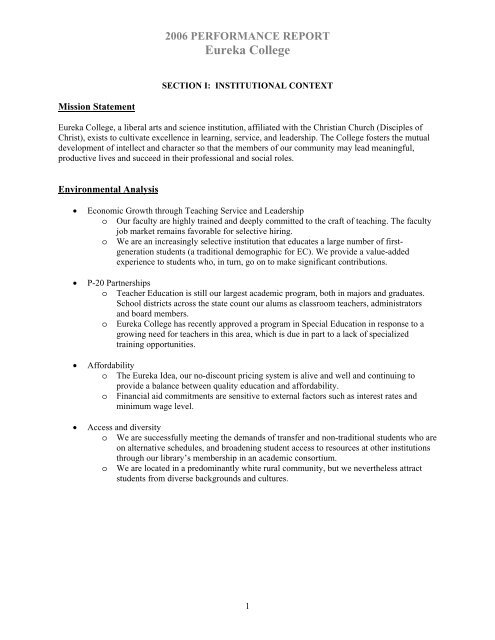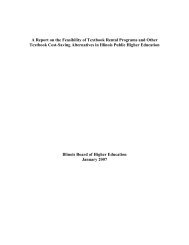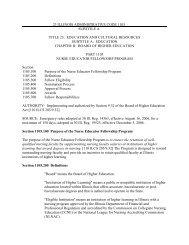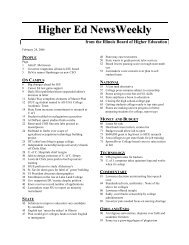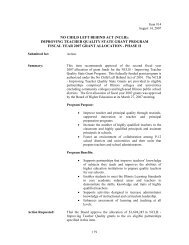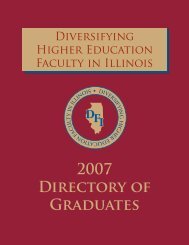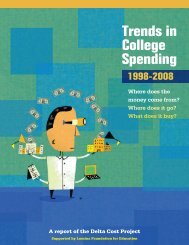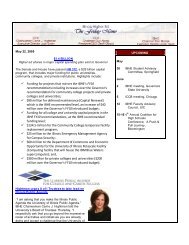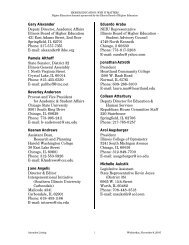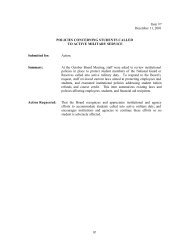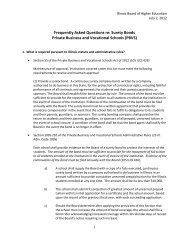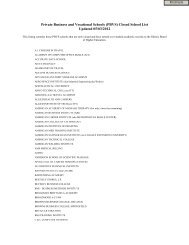Eureka College - IBHE
Eureka College - IBHE
Eureka College - IBHE
Create successful ePaper yourself
Turn your PDF publications into a flip-book with our unique Google optimized e-Paper software.
2006 PERFORMANCE REPORT<br />
<strong>Eureka</strong> <strong>College</strong><br />
SECTION I: INSTITUTIONAL CONTEXT<br />
Mission Statement<br />
<strong>Eureka</strong> <strong>College</strong>, a liberal arts and science institution, affiliated with the Christian Church (Disciples of<br />
Christ), exists to cultivate excellence in learning, service, and leadership. The <strong>College</strong> fosters the mutual<br />
development of intellect and character so that the members of our community may lead meaningful,<br />
productive lives and succeed in their professional and social roles.<br />
Environmental Analysis<br />
• Economic Growth through Teaching Service and Leadership<br />
o Our faculty are highly trained and deeply committed to the craft of teaching. The faculty<br />
job market remains favorable for selective hiring.<br />
o We are an increasingly selective institution that educates a large number of firstgeneration<br />
students (a traditional demographic for EC). We provide a value-added<br />
experience to students who, in turn, go on to make significant contributions.<br />
• P-20 Partnerships<br />
o Teacher Education is still our largest academic program, both in majors and graduates.<br />
School districts across the state count our alums as classroom teachers, administrators<br />
and board members.<br />
o <strong>Eureka</strong> <strong>College</strong> has recently approved a program in Special Education in response to a<br />
growing need for teachers in this area, which is due in part to a lack of specialized<br />
training opportunities.<br />
• Affordability<br />
o The <strong>Eureka</strong> Idea, our no-discount pricing system is alive and well and continuing to<br />
provide a balance between quality education and affordability.<br />
o Financial aid commitments are sensitive to external factors such as interest rates and<br />
minimum wage level.<br />
• Access and diversity<br />
o We are successfully meeting the demands of transfer and non-traditional students who are<br />
on alternative schedules, and broadening student access to resources at other institutions<br />
through our library’s membership in an academic consortium.<br />
o We are located in a predominantly white rural community, but we nevertheless attract<br />
students from diverse backgrounds and cultures.<br />
1
2006 PERFORMANCE REPORT<br />
<strong>Eureka</strong> <strong>College</strong><br />
• Accountable for High Quality and Higher Quality Learning Expectations<br />
o Graduates are encountering highly competitive job markets and social challenges of<br />
growing complexity<br />
o External accreditation and certification bodies continue to raise expectations for academic<br />
accountability, and we continue to rise to the challenge.<br />
• Improve Productivity, Cost-effectiveness, and Accountability<br />
o Under our new President, EC has adopted a new strategic plan of “Growth with Integrity”<br />
ensuring that, by working smarter and not harder, and given continued enrollment<br />
increases EC can expect to grow its way out of its current financial challenges.<br />
o Better monitoring of cash flow allows us to meet unexpected cost increases in health care<br />
insurance, utility rates, and deferred maintenance.<br />
2
2006 PERFORMANCE REPORT<br />
<strong>Eureka</strong> <strong>College</strong><br />
SECTION II: PROGRESS<br />
POLICY AREA ONE: Higher education will help Illinois sustain strong economic growth<br />
through its teaching, service, and research activities.<br />
<strong>Eureka</strong> <strong>College</strong> continues to help Illinois sustain strong economic growth by producing graduates who<br />
embody the ideals of our mission statement and core values. <strong>Eureka</strong> <strong>College</strong> achieves this by offering<br />
students a combination of talented faculty and support staff, a rich and demanding curriculum, and a wide<br />
variety of out-of-class opportunities. This environment challenges students to pursue lives characterized<br />
by lifelong learning, service to others, and fulfillment of their leadership potential.<br />
Learning<br />
Our students are served by a talented faculty who are engaged as much in their roles as teachers as they<br />
are in their disciplines. <strong>Eureka</strong> <strong>College</strong> prides itself on being able to provide students, not with graduate<br />
assistants, but with actual teaching faculty who are also actively engaged in research We have among us,<br />
one faculty member completing a two volume reference work on slavery, another editing a scientific<br />
journal for lepidopterists, an art professor who received an Award of Excellence at the St. Louis<br />
exhibition “Fiber Focus 2005,” and many others who have presented papers and led discussions at major<br />
professional meetings.<br />
<strong>Eureka</strong> <strong>College</strong> also encourages students to present their scholarship, and this past year we had several<br />
students present papers at student conferences in the areas of Political Science and English; one student<br />
gave a session presentation for a conference co-sponsored by the IWU and ISU chapters of Sigma Tau<br />
Delta, the national English Honor Society. Faculty often engage students in their professional<br />
experiences as well, with one example being the group who assisted with hosting the National<br />
Association of Teachers of Singing Artist Award Regional Auditions this past winter.<br />
The <strong>College</strong> promoted several development activities this year to help enhance institutional performance<br />
in key areas. The Dean, our Library Director, and another faculty member attended a Council of<br />
Independent <strong>College</strong>s (CIC) conference on the “Transformation of the <strong>College</strong> Library,” which focused<br />
on the dramatic changes now occurring in colleges, and which was intended to held small- and mid-sized<br />
college libraries deal with those changes. We had several faculty from our education department attend<br />
the ISBE Fall 2005 Institutional Workshop the University of Springfield, which included a session<br />
entitled “Focusing on the Unit Assessment System.” Our library director attended an ILA pre-Conference<br />
workshop focusing on applied statistical tools for librarianship, while faculty members from our<br />
assessment committee attended the 2005 Assessment Institute sponsored by the University of<br />
Indiana/Purdue University-Indianapolis.<br />
At the beginning of the fall semester, the Dean of the college established the Dean’s Club, a fundraising<br />
initiative to help underwrite course-related trips, events, conference attendance, and other activities that<br />
might otherwise be beyond the reach of students. So far the Dean’s Club has helped to fund trips to the<br />
Art Institute in Chicago, a performance of Verdi’s La Traviata at UofI Champaign, a class trip to the<br />
Lincoln Library and Museum in Springfield, and others. The Club is also intended to sponsor campus<br />
events such as the Great Decisions Seminar Series, and an Editors’ Reception honoring members of the<br />
campus involved in editorial activities.<br />
3
2006 PERFORMANCE REPORT<br />
<strong>Eureka</strong> <strong>College</strong><br />
Service<br />
<strong>Eureka</strong> <strong>College</strong> is committed to cultivating an ethic of service to others in its students. The cornerstone of<br />
this effort is our Freshmen Seminar course, in which students are challenged to integrate classroom<br />
learning with community service. The seminar combines classroom discussion and assigned work with<br />
service learning projects in the areas of environmental stewardship, domestic violence, historical<br />
awareness, eldercare and literacy. Many students then go on to participate in other service learning<br />
opportunities, such as the Spring Break mission trips which have taken students to need areas in Los<br />
Angeles, Arizona, and this past spring, to Nicaragua. In addition, ten students participated in the Habitat<br />
for Humanity Collegiate Challenge in <strong>College</strong> Station, Texas during Spring Break. Finally, two students<br />
from the student-founded International Health Care Development Program (IHCDP) went to Costa Rica<br />
during the summer to work with HIV and mentally disabled patients.<br />
Leadership<br />
Leadership cultivation has long been central to the traditional liberal arts mission and is no less relevant<br />
today. <strong>Eureka</strong> <strong>College</strong>, with its small size, offers students wide and varied opportunities for leadership<br />
both in the classroom and out. However, <strong>Eureka</strong> <strong>College</strong> is distinctive in that it has built several<br />
programs around the cultivation of leadership skills, knowledge and attitudes. Foremost among these is<br />
the Ronald W. Reagan Leadership Program, which provides qualified students with an extensive and<br />
tailored leadership training through seminars, retreats, activities, group travel experiences and<br />
international mentorships. The Reagan Program has the added benefit of recruiting a significant number<br />
of semifinalists, over and above the five selected annually; this past year over 45% of those high school<br />
seniors interviewed as semifinalists made <strong>Eureka</strong> their college of choice<br />
The success of these mentorship in opening doors for our graduates led the college to institute, with its<br />
2004 cohort, the Durward Sandifer Mentorship, which provides a similar mentorship opportunity to any<br />
incoming freshman who completes his or her sophomore year with a 3.5 GPA. This past year, our first<br />
eight Sandifer Fellows were selected from this cohort.<br />
This past year, the faculty and Board of Trustees approved a new program in organizational leadership<br />
that will be a weekend cohort program beginning in January 2007.<br />
Indicators<br />
The progress of <strong>Eureka</strong> <strong>College</strong> in addressing Policy Area One bears on the following planning<br />
principals, outlined in the new Strategic Plan, approved by the Board of Trustees in May of this year:<br />
• Focus on students and personal attention in learning<br />
• Promote and ensure the centrality of the liberal arts<br />
• Achieve national recognition for “learning, service, and leadership.”<br />
• Enhance employee professional development, compensation, and benefits<br />
<strong>Eureka</strong> <strong>College</strong> continues to achieve national recognition for its students through its internship program,<br />
which last year placed 53 students state- and nationwide for a total of 218 internship credit hours.<br />
Locations where interns received credit include the U.S. Coast Guard, National Geographic, Caterpillar,<br />
4
2006 PERFORMANCE REPORT<br />
<strong>Eureka</strong> <strong>College</strong><br />
XLC Radio Station, BroMenn Hospital, and others. In addition, the U.S. News and World Report 2007<br />
<strong>College</strong> Guide has just named <strong>Eureka</strong> <strong>College</strong> the number #1 value in the Midwest in the in the “Great<br />
Schools Great Prices” (Comprehensive <strong>College</strong>s—Bachelors) category. --42 nd overall in the the<br />
Midwest.<br />
Our graduates continue to enjoy success in job placement after graduation. Table 1.1 (below) shows the<br />
results of our 2006 graduates survey. Many of our graduates find employment as a direct result of their<br />
internship experiences—an undeniable link between our curriculum and sustaining the economic growth<br />
of the community.<br />
Table 1. Percent of undergraduate degree/certificate recipients either employed or enrolled in<br />
further education within one year of graduation<br />
Number Employed Number of Percent Employed<br />
and/or Enrolled Survey Respondents and/or Enrolled<br />
40 48/39% 83%<br />
5
2006 PERFORMANCE REPORT<br />
<strong>Eureka</strong> <strong>College</strong><br />
POLICY AREA TWO: Higher education will join elementary and secondary education to<br />
improve teaching and learning at all levels.<br />
The commitment of <strong>Eureka</strong> <strong>College</strong> to K-12 partnerships continues to be embodied in its successful<br />
Teacher Education Program, our largest program in terms of majors and graduates—and growing. The<br />
purpose of our Teacher Education Program is to ensure excellence in elementary and secondary education<br />
by the training of teachers who are highly skilled in the performance areas of professionalism, classroom<br />
management, content knowledge, teaching strategies, and technological literacy. The strong presence of<br />
<strong>Eureka</strong> graduates on faculties, administrations, and school boards throughout Illinois is a testament to the<br />
quality of our program and to the depth of our commitment to integrating the educational opportunities<br />
available to Illinois Residents.<br />
For the second year, <strong>Eureka</strong> <strong>College</strong> was the recipient of a State Farm Companies Foundation grant to<br />
continue and expand an assessment study completed the previous year of graduates in the teaching field.<br />
This year the program was expanded to include graduates in private schools and those who are working in<br />
their second jobs. A portion of the grant was also used to implement Teacher Work Samples, a system to<br />
help students better understand how to assess their students in the classroom.<br />
The Teacher Education faculty is currently meeting weekly as part of an ongoing comprehensive review<br />
of the program, which includes “curriculum mapping,” a process which helps ensure that the program is<br />
meeting institutional, state and local guidelines. The college also offers summer workshops on campus for<br />
area teachers seeking graduate credit for recertification.<br />
As the result of a presidential task force to explore and bring new academic programs on campus, the<br />
faculty and board of trustees approved a new program in Special Education. After a review of the<br />
analysis of such bodies as the Regional Office of Education concerning the need for teaching in this area,<br />
along with a state board consultant, such a program seemed to be a natural fit to our existing Education<br />
Program, as well as meeting a measurable and quantifiable need for teachers in this specialized area<br />
across the state—a win-win for all concerned.<br />
Indicators<br />
The progress of <strong>Eureka</strong> <strong>College</strong> in addressing Policy Area Two bears on the following planning<br />
principles:<br />
• Focus on students and personal attention to learning<br />
• Promote and ensure the centrality of the liberal arts<br />
As can be seen from Table 2 below, <strong>Eureka</strong> <strong>College</strong> has seen a significant increase in the number of<br />
students completing certification in education. Moreover, the results in basic skills tests attest to the<br />
<strong>College</strong>’s success in preparing graduates who are capable of doing more than the minimum required<br />
for certification.<br />
6
2006 PERFORMANCE REPORT<br />
<strong>Eureka</strong> <strong>College</strong><br />
Table 2. Annual number of undergraduate students completing requirements for initial<br />
teacher certification by certificate area (Applies only to institutions with teacher education<br />
programs)<br />
Certificate Area 2002-03 2003-04 2004-05<br />
Early Childhood Education --- --- ---<br />
Elementary Education 12 13 14<br />
Secondary Education 5 4 12<br />
Special Education --- --- ---<br />
Total 17 17 26<br />
ICTS Basic Skills Test 2005-06<br />
The Basic Skills Test is designed to assess college-level skills in the four test domains of Reading<br />
Comprehension, Language Arts (Grammar and Writing), Mathematics, and Writing. During the 2005-06<br />
academic year the Unit had 49 students take the ICTS Basic Skills Test. Out of these 49 students, 36<br />
successfully passed the exam. This gives the Unit a pass rate of 73.5%. Note that some students took the<br />
test more than once during the given year.<br />
The possible scores on the Basic Skills Test range from 100 to 300 with a scaled Total Test score of 240<br />
or higher required to pass. The average scores for the test were:<br />
Table 3.<br />
ICTS Basic Skills Test 2005-06 Average Score Sample Size Pass Rate<br />
Total Test 251.8 49 73.5%<br />
Reading Comprehension Subarea 250.8 49 -----<br />
Language Arts Subarea 255.7 49 -----<br />
Mathematics Subarea 246.5 49 -----<br />
Writing Subarea 250.7 49 -----<br />
This average score is well above that which is required to pass the test. These scores are also consistent<br />
with the average scores for students at other institutions around the state, signifying that our students are<br />
right where they need to be at this point in their education.<br />
ICTS Subject-Matter Knowledge Tests 2005-06<br />
Content-area tests are substantial examinations of subject-matter knowledge at a level of understanding<br />
required of educators. They entail the use of conceptual knowledge and thought, not the mere<br />
memorization and recounting of facts. During the 2005-06 academic year, candidates took six (6) of the<br />
ICTS Subject-Matter Knowledge Tests. These included 110 - Elementary and Middle Grades (n = 10),<br />
111 – English (n = 2), 112 – Environmental Science (n = 1), 114 – History (n = 11), 118 – Psychology (n<br />
= 1), and 144 – Physical Education (6-12) (n = 3).<br />
7
2006 PERFORMANCE REPORT<br />
<strong>Eureka</strong> <strong>College</strong><br />
The scores on each of these tests range from 100 to 300 with 240 representing the passing score. The<br />
average Total Test scores for these tests were:<br />
Table 4.<br />
ICTS Subject Matter Knowledge Test 2005-06 Average Score Sample Size Pass Rate<br />
110 - Elementary/Middle Grades 259.8 10 90.0%<br />
111 – English 255.0 2 100%<br />
112 - Environmental Science 252.0 1 100%<br />
114 – History 248.2 11 81.8%<br />
118 – Psychology 254.0 1 100%<br />
144 - Physical Education (6-12) 252.3 3 100%<br />
All of these scores are above the 240 required to pass the test. Also, just like the scores for the Basic<br />
Skills Test, these scores are very similar to the average scores for the state as a whole in each of the<br />
respective areas.<br />
Assessment of Professional Teaching Tests 2005-06<br />
The Assessment of Professional Teaching (APT) Test is a pedagogical test covering the grade levels of<br />
the candidate’s intended teaching certificate, Elementary (K-9) or Secondary (6-12). During the 2005-06<br />
academic year, the Unit had candidates take both the Elementary (n = 11) and Secondary (n = 13) APT<br />
tests.<br />
Again, scores on these tests range from 100-300 with a Total Test score of 240 required to pass. The<br />
average Total Test scores for each test were:<br />
Table 5.<br />
Assessment of Professional Teaching Test 2005-06 Average Score Sample Size Pass Rate<br />
Elementary (K-9) 258.0 11 90.9%<br />
Secondary (6-12) 256.0 13 92.3%<br />
Both of these average scores are above the passing mark. Notice that both the elementary and secondary<br />
students scored about the same on their pedagogy tests.<br />
8
2006 PERFORMANCE REPORT<br />
<strong>Eureka</strong> <strong>College</strong><br />
POLICY AREA THREE: No Illinois citizen will be denied an opportunity for a college<br />
education because of financial need.<br />
<strong>Eureka</strong> <strong>College</strong> is committed to being a school characterized by affordable excellence. As a selective<br />
school that educates a large percentage of first generation students, we recognize the financial challenges<br />
that many of our students and their families face. One of our highest strategic priorities, accordingly, has<br />
been to maintain a pricing model that allows more students to experience the transformations that are<br />
possible through a quality liberal arts education.<br />
Indicators<br />
The progress of <strong>Eureka</strong> <strong>College</strong> in addressing Policy Area Three bears on the following strategic planning<br />
principles:<br />
• Stimulate revenue and endowment growth.<br />
• Achieve national recognition for learning service and leadership.<br />
Since the implementation of our successful pricing model, the “<strong>Eureka</strong> Idea,” we have achieved<br />
significant increases in enrollment. This has not only been vital to the college’s fiscal health, but it has<br />
made <strong>Eureka</strong> <strong>College</strong> an affordable choice for those seeking a private four-year college experience on a<br />
small campus. A win-win situation for both. Last year, the college enrolled 230 freshmen and transfers;<br />
this year our admissions staff projects that as many as 230 new students will be joining our campus this<br />
coming fall. Our tuition through the past year has been kept at the original “<strong>Eureka</strong> Idea” amount of<br />
$13,000. A modest increase planned for the coming year will still keep our base tuition below $14,000 per<br />
year. Our commitment to affordability and excellence earned us yet another #1 ranking in the U.S. News<br />
and World Report “Great Schools, Great Prices.” category.<br />
9
2006 PERFORMANCE REPORT<br />
<strong>Eureka</strong> <strong>College</strong><br />
POLICY AREA FOUR: Illinois will increase the number and diversity of citizens<br />
completing training and education programs.<br />
As stated under Policy Area Three, increasing affordability is has been one of the keys to<br />
increasing our enrollment, and the logical consequence of this comes increases in the number of<br />
graduates. At 127, the class of 2006 was the largest graduating class in the college’s history.<br />
Despite a smaller 2007 cohort, the college expects to graduate subsequently larger and larger<br />
classes in 2008 and 2009. Our ongoing marketing initiatives include<br />
Moreover, the relatively small size of <strong>Eureka</strong> <strong>College</strong> combined with the relative affordability to<br />
other private colleges make<br />
Indicators<br />
As the first college in Illinois to admit men and women on an equal basis, and as a college<br />
founded by men committed to the abolition of slavery, <strong>Eureka</strong> <strong>College</strong> has had a long tradition of<br />
education founded on ideals of diversity. Today, <strong>Eureka</strong> <strong>College</strong> compares favorably with other<br />
Christian Church (Disciples of Christ) schools with a 9% graduation rate of minority students.<br />
Our admissions office maintains the college’s visibility in such publications as Hobson’s<br />
African-American and Hispanic <strong>College</strong> Bound Student guides, as well as their website at<br />
www.collegeview.com. <strong>Eureka</strong> <strong>College</strong> has also been a sponsor for Hispanic Student Month in<br />
Chicago and its suburbs. Both our Admissions and Financial Aid counselors make visits to high<br />
schools in underserved population areas. Part of our appeal, we believe, is that because of our<br />
lowered tuition, we have already removed the “need-based” financial aid barrier to determining<br />
financial aid, and can concentrate on attracting the talent from these areas.<br />
Table 8. New Student Enrollment Data for the last three years<br />
Student Category 2004-05 2005-06 2006-07<br />
(Projected)<br />
Freshman 116 138 137<br />
Transfer 59 59 78<br />
Other 2 2 8<br />
As can be seen, our initiatives and hard work in the admissions office has paid huge dividends these past<br />
three years. The 2006-07 school year anticipates record enrollment.<br />
Table 9. Gender and Ethnicity Data for the last three graduating classes.<br />
Graduation<br />
Female<br />
Male<br />
Year<br />
White Black Hispanic Asian White Black Hispanic Asian<br />
2004 53 1 0 0 36 3 0 1<br />
2005 62 1 0 2 51 4 0 0<br />
2006 67 1 1 4 44 4 1 0<br />
10
2006 PERFORMANCE REPORT<br />
<strong>Eureka</strong> <strong>College</strong><br />
POLICY AREA FIVE: Illinois colleges and universities will be accountable for providing<br />
high quality academic programs and the systematic assessment of student learning<br />
outcomes while holding students to ever higher expectations for learning and growth.<br />
As an educational institution committed to fostering intellectual and character growth in its students,<br />
<strong>Eureka</strong> <strong>College</strong> continually strives to strengthen its academic programs and services to help students<br />
fulfill their potential for learning excellence. An important step toward realizing our commitment to<br />
quality improvement was taken during the 2003-04 academic year, when our then-new Academic<br />
Assessment Team completely restructured the <strong>College</strong>’s Assessment Plan in order to ensure greater<br />
institution-wide accountability. The following discussion in this Policy Area will focus on the team’s<br />
efforts.<br />
Fiscal Year 2006 Accomplishments<br />
The Assessment Team continued to meet regularly during the 2005-06 school year. Among its many<br />
activities and accomplishments was the development of the “Service, Leadership, and Involvement<br />
Profile”, an instrument that will allow students to report on their campus involvement and leadership roles<br />
on campus. Moreover, it is an assessment tool that ties student leadership experiences with the college’s<br />
stated mission to “cultivate excellence in learning, service and leadership.” The faculty approved the<br />
instrument and it will be implemented campus-wide during the 2006-07 school year.<br />
The <strong>Eureka</strong> <strong>College</strong> Assessment Plan underwent some review and revision this past year, particularly<br />
with regard to the addition of a Program Review Protocol and a revision of the General Education<br />
Assessment Plan. The Program Review Protocol is an instrument developed by a subcommittee and is<br />
currently under review by the Academic Affairs Committee and to the Academic Dean’s Office. The<br />
General Education Assessment Plan revisions underwent review and some revision in light of the<br />
program’s first year under the goals passed in 2004-2005.<br />
A review of our Intensive Writing Program, initiated by the committee in 2004-05 was concluded with<br />
recommendations and a proposal for a program revision that was passed by the faculty in Spring of 2006<br />
and is pending approval by the Board of Trustees.<br />
Over the course of the year the committee also requested and collected yearly assessment reports from<br />
majors and sent them to the appropriate persons for review and analysis. And finally, a pre-and postsurvey<br />
of freshmen was administered and analyzed which focused on the goals of the course and student<br />
attitudes about service and leadership.<br />
Fiscal Year 2007 Plans<br />
The Assessment Team will continue to collect and analyze yearly assessment reports on each major. The<br />
team has noted a growing understanding of the assessment process among faculty members, leaving the<br />
committee more time for analysis and requiring less time for educating our colleagues about the role of<br />
assessment in our teaching. In light of this growing acceptance the committee hopes to develop and lead<br />
workshops for colleagues on course-embedded assessment. As part of the Program Review rotation model<br />
will be jointly developed by the committee and the Dean of the <strong>College</strong>. Information. An analysis<br />
11
2006 PERFORMANCE REPORT<br />
<strong>Eureka</strong> <strong>College</strong><br />
instrument will soon be under development to gain the fullest benefit from the information gathered by<br />
the Service Leadership and Involvement Profile referenced above.<br />
Finally, the Assessment Team is especially keen on a return to the National Study of Student<br />
Engagement, better known as “Nessie (NSSE).” Last administered in 2002, the college freshmen<br />
compared favorably in the overall benchmark, while senior engagement lagged bit. It is a stated goal of<br />
the current strategic plan to achieve 60 th percentile or better across five dimensions by 2009.<br />
Fiscal Year 2007 Challenges<br />
Like many other small colleges with limited faculty and budget resources, <strong>Eureka</strong>'s biggest challenge is to<br />
grow faculty expertise in assessment without the benefit of a full-time staff position focused exclusively<br />
on assessment. Thus, looking forward, our assessment committee will continue to provide the leadership<br />
in this critical area and individual faculty will be challenged to find time in their busy teaching and<br />
institutional service schedules to continue their own professional development activities related to<br />
assessment. One notable exception is the Education faculty who have received two years of grant support<br />
from the State Farm Foundation to improve the assessment of their teacher education program.<br />
Indicators<br />
The progress of <strong>Eureka</strong> <strong>College</strong> in addressing Policy Area Five bears on several strategic planning<br />
principles and key results areas:<br />
• Focus on students and personal attention in learning (in part, again, through returning to NSSE)<br />
• Achieve National Recognition for learning service and leadership<br />
• Enhance employee professional development<br />
• Strengthen our relationship with our Alumni and other constituent groups<br />
Table 10. Satisfaction ratings on <strong>Eureka</strong> <strong>College</strong> institutional goals, from 2005 Alumni<br />
Interests Survey.<br />
Institutional Goals<br />
Intellect Comm.<br />
Skills<br />
Aesthetic<br />
Aware.<br />
Cultural<br />
Aware.<br />
Natural<br />
Environ.<br />
Fitness Professional<br />
Competence<br />
Social<br />
Aware.<br />
Personal<br />
Values<br />
Leadership,<br />
Service<br />
Mean 4.97 5.09 4.57 4.48 4.31 4.24 5.13 4.83 4.84 4.77<br />
Median 5 5 5 5 4 4 5 5 5 5<br />
Sample<br />
Size 573 573 572 568 569 570 569 571 568 564<br />
Our most recent satisfaction survey, administered to all alumni in lieu of NSSE in 2005 shows the extent<br />
to which they believed that <strong>Eureka</strong> <strong>College</strong> had achieved each of its 10 institutional goals on a scale of 1-<br />
6. As shown in the above table, alumni expressed satisfaction with our treatment of every goal, although<br />
they felt most prepared in the areas of communication skills and professional competence, affirming our<br />
Writing and disciplinary programs.<br />
12
2006 PERFORMANCE REPORT<br />
<strong>Eureka</strong> <strong>College</strong><br />
Table 11. Pass rates on professional/occupational licensure examinations relative to national<br />
averages.<br />
Pass Rate Information for Selected Exams:<br />
Number of Students Tested, Institutional Pass Rate & National Pass Rate<br />
2002-03 2003-04 2004-05<br />
# Pass Rate (%) # Pass Rate (%) # Pass Rate (%)<br />
Field Examination Students Inst’l Nat’l Students Inst’l Nat’l Students Inst’l Nat’l<br />
Law<br />
Illinois Bar Exam:<br />
First-Time Takers, Summer<br />
-- ---- 80 1 100 80 3 100 80<br />
Medicine<br />
U.S. Medical Exam,<br />
Step 2<br />
* 100 95 * 100 94 * 100 92<br />
Dentistry<br />
National Dental Board<br />
Exam, Part II<br />
-- -- -- -- -- -- -- -- --<br />
Nursing<br />
National Council Licensure<br />
Exam, RN<br />
* 100 87 * 100 85 -- -- --<br />
*no data<br />
External validation, as always, is an important indicator of our success in educational<br />
effectiveness. Of particular note is the upswing in students preparing for degrees in law, and<br />
while the date range of the current chart does not show it, we have recently had a student pass the<br />
National Dental Board Exam—the first attempt in many years.<br />
13
2006 PERFORMANCE REPORT<br />
<strong>Eureka</strong> <strong>College</strong><br />
POLICY AREA SIX: Illinois colleges and universities will continually improve<br />
productivity, cost-effectiveness, and accountability.<br />
Fiscal Year 2006 Accomplishments<br />
Under its new President, the college is working towards a “work smarter, not harder” ethic has that<br />
resulted in a number of initiatives and accomplishments across campus.<br />
Retention is the key to fiscal soundness in a tuition driven environment. And although <strong>Eureka</strong>’s retention<br />
may compare favorably to national averages, improvement in this area is still critical to our fiscal wellbeing.<br />
The academic year 2005-2006 was a banner year for retention, being above 500 in the second<br />
semester for only the second time in its history. This is the result of a number of campus initiatives:<br />
increased admissions standards, improvements in campus housing facilities, and maintaining our<br />
affordability under the “<strong>Eureka</strong> Idea” (now in its third year). But also, there is an increased awareness<br />
across campus that retention is not just the job of the admissions office: there are things we all can do,<br />
inside and outside of the classroom to make EC a good choice for students to stick with.<br />
The Business Office has increased its staff 1.5 FTE which has in turn improved its communication of<br />
critical budget information to senior staff, budget managers, and trustees. The ability to make informed<br />
budget decisions over the course of the year has had a significant impact on the school’s ability to stretch<br />
its cash flow deeper into the summer months, traditionally a “lean time” with summer school having only<br />
a moderate, though increasing, impact on revenue.<br />
One area of resource management the college has undertaken involves the consolidation and managed use<br />
of office equipment such as copiers and printers across campus. Many older devices were replaced with<br />
“multifunctional devices” (copier/printer/scanner/fax) machines which allow, among other things,<br />
centralized tracking of paper usage. In the coming year, it will be possible to begin charging for student<br />
copying over an allotted amount of printouts per semester, the idea being that the campus can now<br />
encourage judicious use of resources by students, faculty and staff alike, while recovering costs in a way<br />
that balances student expectations with campus resource consumption.<br />
The college completed the first stage of what it hopes to be an ongoing effort to replace older, less<br />
energy-efficient lighting fixtures to conserve energy and cut energy costs. A $4000 grant from the Illinois<br />
Clean Energy Foundation allowed us to replace older lighting fixtures with more energy efficient units in<br />
the administrative offices of the campus. This grant follows up on a $36,000 award from the previous<br />
year to replace fixtures on the academic side, resulting in a significant savings in utilities costs overall.<br />
Fiscal Year 2007 Plans<br />
<strong>Eureka</strong> <strong>College</strong> has been, and will continue to work toward a budget model that will allow the college to<br />
operate solely on its revenue stream (i.e. tuition) and rely less on unrestricted giving to cover operational<br />
costs. Of course, this will be made easier through enrollment increase, but it will also be effected, in part,<br />
through an ongoing evaluation of expenditures and capital outlay based on a “return on investment”<br />
concept. Additionally, the Board has approved a 5% contingency of net reserve to offset any last minute<br />
facilities expenses that might normally be a hardship over the course of the year. The Business Office<br />
plans to adopt stricter policies related to P.O. and cash disbursement payments. This is not only an issue<br />
to be addressed with campus budget managers but it also involves communicating billing and other<br />
expectations with our vendors more clearly.<br />
14
2006 PERFORMANCE REPORT<br />
<strong>Eureka</strong> <strong>College</strong><br />
Fiscal Year 2007 Challenges<br />
The age of many of our facilities presents an ongoing challenge, not only from a maintenance standpoint,<br />
but also from the standpoint of resource consumption. While a plan is in place to address many deferred<br />
maintenance issues, new issues continue to arise and place a strain on resources. Rising energy costs also<br />
continue to be a concern as these resources continue to be used by facilities and equipment designed for a<br />
less energy conscious age.<br />
Even with our recent increases in enrollment and tighter budget controls, finances continue to be a<br />
challenge to the college. Our immediate challenge is seeing the current strategic plan through, and this<br />
will depend largely on our ability to keep enrollment on the increase.<br />
Indicators<br />
The progress of <strong>Eureka</strong> <strong>College</strong> in Policy Area Six Bears on the following strategic planning principles:<br />
• Stimulate revenue and endowment growth<br />
• Promote efficiency and intentional reallocation of resources.<br />
• Primary measures will be budgets that are accrual and cash balanced, other supporting key<br />
performance Indicators/Ratios targets that are listed below:<br />
o Composite Financial Index (CFI) greater than (>) .4<br />
o Viability Ratio (Expendable Financial Resources to Debt) > .9<br />
o Primary Reserve Ratio (Expendable Financial Resources to Operations) > .4<br />
o Debt Burden Ratio (Annual Debt Service to Unrestricted Expenditures) > .6<br />
Table 12. Percent of first-time, full-time, degree-seeking freshmen who complete their degree<br />
within 150% of catalog time, for each of the past three years.<br />
Cohort Year Cohort Size Graduates Graduation Rate<br />
1998 118 69 58.5%<br />
1999 138 77 55.8%<br />
2000 116 58 48.7%<br />
Table 13. Fall-to-Spring, Spring to Fall, and Fall to Fall retention rates for each of the past<br />
three years.<br />
Year Fall to Spring Spring to Fall Fall to Fall<br />
2003-04 92.4% 84.9% 77.5%<br />
2004-05 89.1% 81.6% 72.2%<br />
2005-06 90.0% 88.8% 80.0%<br />
15
2006 PERFORMANCE REPORT<br />
<strong>Eureka</strong> <strong>College</strong><br />
Table 14. Freshmen Cohort Year 1 Retention rates .<br />
Freshmen Cohort Fall to Spring Spring to Fall Fall to Fall<br />
2003 83.7% 67.5% 56.5&<br />
2004 87.9% 72.5% 63.8%<br />
2005 95.7% 87.4% 81.0%<br />
While overall retention rates have risen dramatically this past year, Table 14 shows the most dramatic<br />
improvement of all with the 2005 freshmen cohort rate actually exceeding the overall figure for<br />
the college (Table 13).<br />
16


